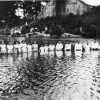calsfoundation@cals.org
Caleb Darnell Pettaway (1886–1968)
The Reverend Caleb Darnell (C. D.) Pettaway was an influential Little Rock (Pulaski County) religious leader who served as president of the National Baptist Convention of America (NBCA) from 1957 to 1967.
Caleb Darnell Pettaway, commonly referred to as “C. D.,” was born on December 18, 1886, in Concordia Parish, Louisiana. Sources conflict as to his birth name—he is listed as Charles, Cyrus, and Claude in various years of the Little Rock city directory. However, his World War I and World War II draft cards are clearly signed as “Caleb.”
In 1918, Pettaway married Jennie E. Vagner of Independence County and apparently moved to Arkansas around that time. Together, they moved to Little Rock and bought a house located at 519 E. 21st Street. The couple had two children, Paul Evans Pettaway (1919–1968) and Louise Pettaway (1922–1960). Jennie Pettaway died in 1944, and in 1958 Pettaway married Cleola Hampton.
Following the move to Little Rock, Pettaway earned a degree at Philander Smith College. He also attended the University of Chicago.
Pettaway became pastor at Shiloh Missionary Baptist Church in September 1927; he had apparently been ordained prior to that, though the exact date is unknown. He occasionally lent his services to local schools, for example, providing the sermon for Dunbar High School’s 1948 graduation. His influence also extended to a statewide level, as he served as president of the General Missionary Baptist State Convention of Arkansas. During his tenure at Shiloh Missionary Baptist Church, he presided over the church through the desegregation of Little Rock Central High School and the tumultuous civil rights movement, preaching nonviolence throughout the period. At a convention meeting in Kansas City, Missouri, in September 1966, Pettaway was quoted by Jet Magazine stating that “Martin Luther King’s way for us is the best way. That way is nonviolence.”
While serving as pastor at Shiloh Baptist, Pettaway was elected president of the National Baptist Convention of America, serving from 1957 to 1967. Previously, he hosted the national convention in September 1947 in Little Rock. The NBCA originated from an 1895 split within the National Baptist Convention, U.S.A., due to disputes over publishing rights, becoming a major black Baptist convention by the mid-twentieth century. In 1956, it boasted an estimated membership of 2,668,799 adherents spread out across 11,398 churches. By 1963, there were 3,750,000 members nationally and 1,500 to 2,000 members in Arkansas. (In 2020, the National Baptist Convention of America International, Inc., estimated its membership at 3,500,000.) Despite the small size of the Arkansas congregation, in an interview with the Arkansas Gazette on September 16, 1963, Pettaway noted that the NBCA elected him “over fellows from New York, Chicago, Los Angeles and all those places.” He added that they deemed him a “good fellow, honest, and Christian.”
In addition to his work as a pastor, Pettaway was instrumental in providing health services to Little Rock. In 1918, he and Dr. Fred Thomas Jones founded the United Friends of America Fraternal Benefit Society, which provided much-needed medical care and burial insurance for Little Rock’s African-American community. Initially, both white and black doctors provided services at the Great Southern Fraternal Hospital for members of United Friends, as well as the Independent Order of Immaculates. The Great Southern Fraternal Hospital operated at the corner of 9th and State streets until its closure in 1929. Health care “plans” were provided in a similar manner to Blue Cross and Blue Shield subscriptions.
By 1963, Pettaway had received two honorary degrees from Arkansas Agricultural, Mechanical, and Normal College (now the University of Arkansas at Pine Bluff) and Arkansas Baptist College.
Pettaway died on August 20, 1968, and is buried at Haven of Rest Cemetery in Little Rock. His son, Paul, died the following month, and Cleola Hampton Pettaway assumed full control of the fraternal society, hospital, and funeral home previously operated by the family, managing them until her death on September 30, 1975.
In 1970, the city acquired land from Pettaway’s estate to create Pettaway Park on 21st and 22nd streets between Commerce and Bragg streets. Formerly known as East Broadway, the neighborhood located between Scott Street on the west, Interstate 30 on the east, 15th Street on the north, and Roosevelt Road on the south was renamed in 1994 to honor Rev. Pettaway. The Pettaway House on 21st St. still stands in the twenty-first century, located just east of Pettaway Park.
For additional information:
Clark, John Franklin. A Brief History of Negro Baptists in Arkansas: A Story on their Progress and Development, 1867–1939. Pine Bluff, AR: N.p., 1940.
“Heading National Baptist Convention Only a Part of the State Pastor’s Work.” Arkansas Gazette, September 16, 1963.
Philip Purifoy
Arkansas Historic Preservation Program
 Religion
Religion World War II through the Faubus Era, 1941 through 1967
World War II through the Faubus Era, 1941 through 1967




Comments
No comments on this entry yet.